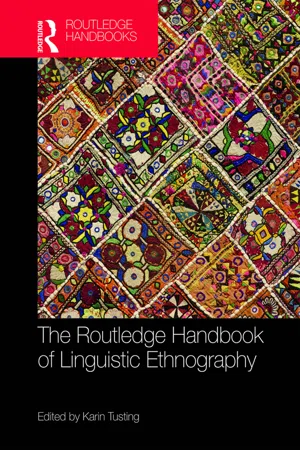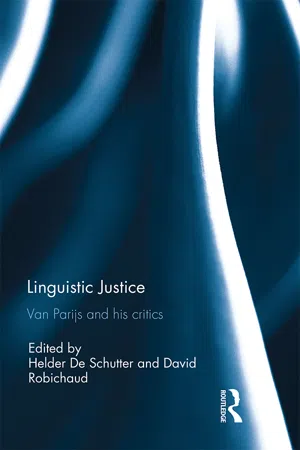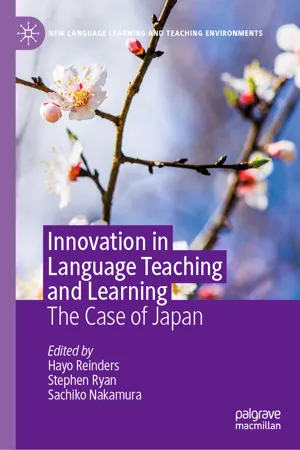English as a lingua franca
English as a lingua franca refers to the use of English as a common language for communication between speakers of different native languages. It is often used in international business, diplomacy, and academia. As a result, English has become a global language, facilitating communication and understanding across diverse linguistic and cultural backgrounds.
7 Key excerpts on "English as a lingua franca"
- eBook - ePub
- Karin Tusting, Karin Tusting(Authors)
- 2019(Publication Date)
- Routledge(Publisher)
...While a lingua franca might (from a somewhat naïve position) be perceived as a ‘neutral’ medium of interaction, several researchers have pointed out that English is anything but neutral (Phillipson, 1992; Grin, 2018; Ricento, 2018). According to the view represented by these authors, the contemporary dominance of English in transnational domains such as business, science and higher education can be seen as the result of historical processes characterised by social and linguistic hegemony ‘inseparable from issues of power’ (Grin, 2018, p. 264). Reconceptualising the widespread use of English as ‘English as a lingua franca’ does not, in their view, change the fact that the current dominance of English as a ‘global’ lingua franca perpetuates deep-seated social and linguistic inequalities and global power asymmetries. In fact, the notion of ‘English as a lingua franca’ may actively contribute to the problem by naturalising rather than problematising the status of English as ‘the’ global language. In a similar vein, it may be argued that the idea that speakers who use a lingua franca habitually and professionally should be seen as successful language users, rather than deficient language learners, runs the risk of simplifying often very complex relationships between language and identity. Research that focusses on language attitudes and ideology in lingua franca contexts has found that speakers may exhibit mixed attitudes towards their use of a lingua franca, which shows the value and importance of considering speakers’ emic perspectives in understanding these settings. In a small-scale interview-based study of students at an international BA programme in Denmark, Mortensen and Fabricius (2014) found that the students interviewed valued communicative effectiveness higher than a particular English accent. This would apparently lend support to the idea that these speakers should not be evaluated – and did not evaluate themselves – against a ‘native’ speaker yardstick...
- eBook - ePub
On the Subject of English
The Linguistics of Language Use and Learning
- Henry Widdowson(Author)
- 2019(Publication Date)
- De Gruyter Mouton(Publisher)
...Section 4: English as a lingua franca Preamble This book is an exploration, from a particular theoretical perspective, of the nature of language use and learning. The language that has the widest range of use in the contemporary world is English. Its use as an international lingua franca serves the needs of communication brought about by the increased movement of people, across borders, both free and enforced, and the vastly extended networks of digital interaction. The question arises as to how far this globalization of English, its expedient appropriation as a lingua franca, calls for different ways of thinking about the language. And if it does, then what are the implications for the way English might be designed as a pedagogic subject? And how far, more generally, can language use and learning be taken as separate and distinct processes – a question that takes us back to the issues discussed in Section 2 about the relationship between linguistics and applied linguistics. A key issue concerning the linguistic description of ELF as a use of language relates to the immediately preceding discussions in Section 3. There what was stressed was the essential indeterminacy of language, how its use can be pragmatically adapted to accord with different contextual and pretextual factors. When English is used in communication within a community of its native speakers, its users can rely on shared lingua-cultural presumptions about what is socially customary and appropriate on different occasions of use. In this case, what can be described is how the members of a particular community conventionally use their communal language to communicate with each other...
- eBook - ePub
- Robert Phillipson(Author)
- 2013(Publication Date)
- Routledge(Publisher)
...The fact that English is used for a wide range of purposes, nationally and internationally, may mislead one into believing that lingua franca English is disconnected from the many ‘special purposes’ it serves in key societal domains. English might be more accurately described as a lingua economica (in business and advertising, the language of corporate neoliberalism), a lingua emotiva (the imaginary of Hollywood, popular music, consumerism and hedonism), a lingua academica (in research publications, at international conferences, and as a medium for content learning in higher education), or a lingua cultura (rooted in the literary texts of English-speaking nations that school foreign language education traditionally aims at, and integrates with language learning as one element of general education). English is definitely the lingua bellica of wars between states (aggression by the US and its loyal acolytes in Afghanistan and Iraq, building on the presence of US bases in hundreds of countries worldwide). The worldwide presence of English as a lingua americana is due to the massive economic, cultural and military impact of the USA. Labelling English as a lingua franca, if this is understood as a culturally neutral medium that puts everyone on an equal footing, does not merely entail ideological dangers—it is simply false. The history, etiology and misuse of the concept will be explored below. While English manifestly opens doors for many worldwide, it also closes them for others, as recounted by an Indian with experience of the language being seen as a lingua divina (Chamaar, 2007), for which he had rather more empirical justification than the hopefully apocryphal story of the American head teacher informing immigrants that if English was good enough for Jesus, it was good enough for them. It wasn’t until he was 18 that Kanchedia Chamaar realized that God spoke and understood English and nothing else...
- eBook - ePub
- Pekka Lintunen, Maarit Mutta, Pauliina Peltonen(Authors)
- 2019(Publication Date)
- Multilingual Matters(Publisher)
...(1996) The discursive accomplishment of normality: On ‘lingua franca’ English and conversation analysis. Journal of Pragmatics 26 (2), 237–259. Götz, S. (2013) Fluency in Native and Nonnative English Speech. Amsterdam: John Benjamins. House, J. (1999) Misunderstanding in intercultural communication: Interactions in English as lingua franca and the myth of mutual intelligibility. In C. Gnutzmann (ed.) Teaching and Learning English as a Global Language (pp. 73–89). Tübingen: Strauffenburg. House, J. (2002) Developing pragmatic competence in English as a lingua franca. In K. Knapp and C. Meierkord (eds) Lingua Franca Communication (pp. 245–268). Frankfurt am Main: Peter Lang. Hüttner, J. (2009) Fluent speakers – fluent interactions: On the creation of (co)-fluency in English as a lingua franca. In A. Mauranen and E. Ranta (eds) English as a lingua franca: Studies and Findings (pp. 274–297). Newcastle upon Tyne: Cambridge Scholars Publishing. Hynninen, N. (2012) ICL at the micro level: L2 speakers taking on the role of language experts. AILA Review 25, 13–29. Hynninen, N. (2016) Language Regulation in English as a lingua franca: Focus on Academic Spoken Discourse. Berlin: De Gruyter Mouton. Jenkins, J. (2000) The Phonology of English as an International Language. Oxford: Oxford University Press. Jenkins, J. (2007) English as a lingua franca: Attitude and Identity. Oxford: Oxford University Press. Kachru, B.B. (1996) Opening borders with world Englishes: Theory in the classroom. In S. Cornwell, P. Rule and T. Sugino (eds) On JALT96: Crossing Borders. The Proceedings of the 23rd Annual JALT International Conference on Language Teaching/Learning, Hiroshima, Japan, November 1996 (pp. 10–20). JALT, Tokyo. Kaur, J. (2009) Pre-empting problems of understanding in English as a lingua franca. In A. Mauranen and E. Ranta (eds) English as a lingua franca: Studies and Findings (pp. 107–123). Newcastle upon Tyne: Cambridge Scholars Publishing. Kaur, J...
- eBook - ePub
Linguistic Justice
Van Parijs and his Critics
- Helder De Schutter, David Robichaud, Helder De Schutter, David Robichaud(Authors)
- 2017(Publication Date)
- Routledge(Publisher)
...But if a lingua franca takes hold in that domain and we generalise the model, there are consequences for those on whom the burden of learning a new language is imposed. I return to these issues below. Another assumption lies behind the maxi-min strategy, at least as part of an explanation of why English is emerging as the lingua franca. Why is English a better bet in Europe than German or French? Because anglophones are often part of the conversation, and the one sure thing is that most of them will speak only English. Monolingualism is less true of native speakers of other European languages. The more others adapt to anglophone incompetence or intransigence, the more the salience of English is entrenched. Those willing to learn another language, even rudimentarily, will be at a disadvantage in the company of those who refuse to do so, at least if the willing learners have an interest in their language becoming the lingua franca. In principle, willingness to learn ought to be equally distributed amongst all peoples, but in practice willingness or lack thereof often stems from previously entrenched forms of social inequality. Anglophones do not just happen not to speak a second or third language; they largely exist in a social and political culture that has entitled them not to do so, and they often feel no obligation to meet others even half way. Absent these forms of social power, and thus privilege, it is questionable whether a single lingua franca would emerge at all, let alone that it would be English. To the extent that Van Parijs acknowledges this dynamic in the parable of his tussle with his father-in-law over the hoovering (2011, pp. 51–52), he treats it as grounds for compensation for an unfair outcome rather than a reason to prevent unfair outcomes from emerging. If a particular state of affairs is inevitable, though unfair, we should just figure out how to go forward as fairly as possible...
- eBook - ePub
- Nicola Galloway, Heath Rose(Authors)
- 2015(Publication Date)
- Routledge(Publisher)
...It is a pluricentric concept, growing both as a phenomenon in general and as a field of study. Language acts as a tool in globalization to help people connect, and it is clear from Chapter 3 that the globalization of English has received much attention. However, globalization – and the use of ELF specifically – has also influenced the language itself. ELF as a phenomenon has been described throughout this book, but in this chapter we explore what happens to English when it is used as a lingua franca. In doing so we examine past and current research trends, criticisms and misunderstandings, and the future directions of ELF research. Table 7.1 Conceptual differences between EFL and ELF Objectives Foreign language (EFL) Lingua franca (ELF) Lingua-cultural norms Objectives Pre-existing, re-affirmed Integration, membership in native-speaking community Ad hoc, negotiated Intelligibility, communication in a non-native speaker or mixed non-native speaker–native-speaker interaction Processes Imitation, adoption Accommodation, adaptation Source: Seidlhofer, 2011, p. 18 We begin in Section 7a with a theoretical and descriptive overview of ELF research, focusing on pronunciation and lexicogrammar. Section 7b examines the pragmatics of ELF communication, highlighting the shift in research focus away from the documentation of regularities or common features in early days. ELF research has been conducted in a number of domains; Section 7c provides an overview of the business domain, business English as a lingua franca (BELF). ELF throws a new perspective on language change, and ELF also lets us revisit English and reconceptualize many of the fundamental concepts underpinning language in general. In Section 7d we return to many of the concepts that have been introduced at various points in the book, such as language change and variation, language contact, standardization, language varieties, and ownership. ELF research has become the subject of considerable debate and criticism...
- eBook - ePub
Innovation in Language Teaching and Learning
The Case of Japan
- Hayo Reinders, Stephen Ryan, Sachiko Nakamura, Hayo Reinders, Stephen Ryan, Sachiko Nakamura(Authors)
- 2019(Publication Date)
- Palgrave Macmillan(Publisher)
...In J. Jenkins, W. Baker, & M. Dewey (Eds.), The Routledge handbook of English as a lingua franca (pp. 441–455). Oxon: Routledge. Graddol, D. (2006). English next. London: British Council. Illés, E. (2016). Issues in ELF-aware teacher education. Journal of English as a lingua franca, 5 (1), 135–145. Crossref Jenkins, J. (2000). The phonology of English as an international language. Oxford: Oxford University Press. Jenkins, J. (2006). Current perspectives on teaching world Englishes and English as a lingua franca. TESOL Quarterly, 40 (1), 157–181. Crossref Jenkins, J. (2015). Global Englishes: A resource book for students (3rd ed.). London: Routledge. Jenkins, J. (2017). English as a lingua franca in the expanding circle. In M. Filppula, J. Klemola, & D. Sharma (Eds.), The Oxford handbook of world Englishes (pp. 549–566). Oxford: Oxford University Press. Jenkins, J., Baker, W., & Dewey, M. (Eds.). (2018). The Routledge handbook of English as a lingua franca. Oxon: Routledge. Kachru, B. (1992). Teaching world Englishes. In B. Kachru (Ed.), The other tongue: English across cultures (2nd ed., pp. 355–365). Oxford: Pargamon. Kachru, B. (2005). Asian Englishes: Beyond the canon. Hong Kong: University of Hong Kong Press. Lowenberg, P. (2012). Assessing proficiency in EIL. In A. Matsuda (Ed.), Principles and practices of teaching English as an international language (pp. 84–102). Bristol: Multilingual Matters. Crossref McNamara, T. (2012). English as a lingua franca: The challenge for language. Journal of English as a lingua franca, 1 (1), 199–202. Crossref Rampton, B. (1990). Displacing the “native speaker”: Expertise, affiliation and inheritance. ELT Journal, 44 (2), 97–101. Crossref Rivers, D. (2013). Institutionalized native-speakerism: Voices of dissents and acts of resistance. In S. A. Houghton & D. Rivers (Eds.), Native-speakerism in Japan: Intergroup dynamics in foreign language education (pp. 75–91). Bristol: Multilingual Matters. Crossref Seargeant, P. (2016)...






